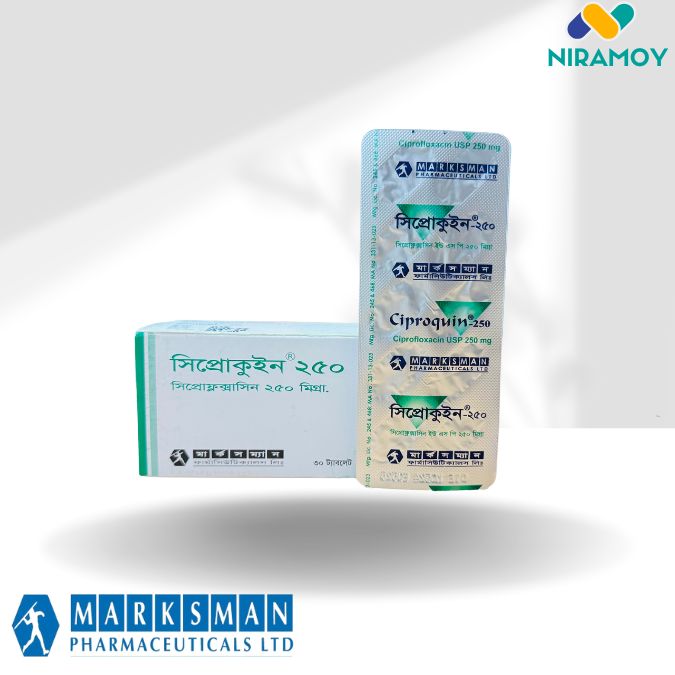



Ciproquin 250 mg Tablet is an antibiotic containing ciprofloxacin, which belongs to the fluoroquinolone class. It is used to treat various bacterial infections such as urinary tract infections, respiratory tract infections, skin infections, and gastrointestinal infections. Ciproquin works by inhibiting bacterial DNA gyrase, preventing bacterial replication and growth. It is usually prescribed for short-term use under medical supervision. Read more
Ciproquin 250 mg is an oral antibiotic that contains ciprofloxacin, a broad-spectrum fluoroquinolone antibiotic used to treat a wide range of bacterial infections. It works by inhibiting bacterial enzymes DNA gyrase and topoisomerase IV, which are essential for bacterial DNA replication, transcription, repair, and recombination. This inhibition leads to bacterial cell death, making ciprofloxacin effective against many Gram-negative and some Gram-positive bacteria.
Urinary tract infections (UTIs)
Respiratory tract infections (bronchitis, pneumonia)
Skin and soft tissue infections
Gastrointestinal infections, including infectious diarrhea
Bone and joint infections
Certain sexually transmitted infections
Prophylaxis and treatment of anthrax exposure
Typical adult dose: 250 mg every 12 hours (may vary depending on infection severity and physician guidance)
Tablets should be taken with plenty of water, with or without food
Avoid taking with dairy products or calcium-fortified juices alone as they may reduce absorption
Complete the full prescribed course to prevent resistance
Well absorbed orally, with peak plasma concentrations reached within 1-2 hours
Metabolized partially by the liver and eliminated mainly via the kidneys
Half-life approximately 4 hours
Common:
Nausea
Diarrhea
Dizziness
Headache
Abdominal discomfort
Serious (less common):
Tendonitis and tendon rupture (especially in elderly or corticosteroid users)
Photosensitivity reactions
Peripheral neuropathy
Clostridium difficile-associated diarrhea
Allergic reactions
Hypersensitivity to ciprofloxacin or other quinolones
Tendon disorders related to quinolone therapy
Concurrent use with tizanidine
Children and adolescents (unless benefits outweigh risks)
Use cautiously in patients with a history of seizures or CNS disorders
Avoid excessive exposure to sunlight or UV light due to photosensitivity risk
Not recommended during pregnancy and breastfeeding unless absolutely necessary
Adjust dosage in renal impairment
May interact with antacids, sucralfate, iron supplements, and multivitamins containing magnesium or aluminum (reduce ciprofloxacin absorption)
Can increase plasma levels of theophylline, warfarin, and caffeine
Avoid concurrent use with corticosteroids due to increased tendon rupture risk
Store below 30°C in a dry place
Keep out of reach of children
Ciproquin 250 mg is a potent and versatile antibiotic ideal for treating various infections. However, it should be used responsibly and only under medical supervision to avoid resistance and adverse effects.
| Specifications | Descriptions |
|---|---|
| Brand Name | Ciproquin |
| Generic Name | Ciprofloxacin |
| Strength | 250 mg |
| Therapeutic Class | Fluoroquinolone antibiotic |

Lorem, ipsum dolor sit amet consectetur adipisicing elit. Exercitationem, facere nesciunt doloremque nobis debitis sint?